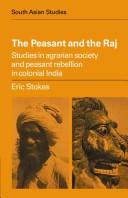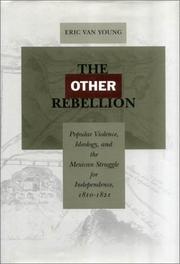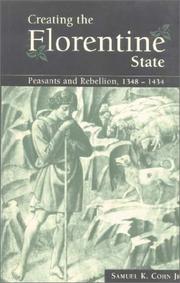| Listing 1 - 10 of 42 | << page >> |
Sort by
|
Book
ISBN: 2707113786 9782707113788 Year: 1976 Publisher: Paris: Maspero,
Abstract | Keywords | Export | Availability | Bookmark
 Loading...
Loading...Choose an application
- Reference Manager
- EndNote
- RefWorks (Direct export to RefWorks)
Book
ISBN: 8175968257 8175963166 Year: 2006 Publisher: New Delhi : Foundation Books,
Abstract | Keywords | Export | Availability | Bookmark
 Loading...
Loading...Choose an application
- Reference Manager
- EndNote
- RefWorks (Direct export to RefWorks)
Sri Putchalapalli Sundarayya (1 May 1913 19 May 1985) was a renowned national liberation fighter. He was one of the founders of the Communist Movement in India and an indefatigable fighter for the rights of toiling masses of India. He led the glorious Telangana peasant armed struggle in the 1940s against the despotic rule of Nizam of Hyderabad and liberated many from the shackles of servitude under Vetti. Sundarayya provides a detailed description of the intricacies - both decision-making and the execution of plans by the various guerilla squads. The book provides a ringside view of the movement of squads, the network of communications and the police terror. It highlights the movement, the years in the forests fighting the Nizam's forces and then the Indian army. It provides a wealth of detail and any account of the Telengana struggle is incomplete without reference to this authoritative work.
Peasant uprisings --- Communism --- Telengana Region (India) --- Politics and government.
Book
ISBN: 9782271077820 Year: 2013 Publisher: Paris : CNRS,
Abstract | Keywords | Export | Availability | Bookmark
 Loading...
Loading...Choose an application
- Reference Manager
- EndNote
- RefWorks (Direct export to RefWorks)
Observant le rythme des rébellions et des guerres civiles qui ont secoué l'Europe, l'auteur montre que la violence politique échappe à son statut d'exception pour devenir une institution sociale, un fait de culture des anciennes communautés préindustrielles. Les arguments qui légitiment l'intervention de la force dans les rapports sociaux relèvent de thèmes intemporels : âge d'or, Dieu, etc.
Revolutions --- Peasant uprisings --- Révolutions --- Révoltes paysannes --- History --- Histoire --- Révolutions --- Révoltes paysannes
Book
ISBN: 9782363583215 2363583213 Year: 2019 Publisher: Paris : Vendémiaire,
Abstract | Keywords | Export | Availability | Bookmark
 Loading...
Loading...Choose an application
- Reference Manager
- EndNote
- RefWorks (Direct export to RefWorks)
"Jusqu'en 1931, la population rurale était majoritaire en France. La seconde révolution agricole a ensuite soumis les agriculteurs à une constante pression modernisatrice, dans une société de plus en plus ouverte sur l'Europe et sur le monde, de plus en plus centrée sur l'activité des villes et des industries. Face à cette inexorable marginalisation, la profession a su élaborer des modes de protestation spécifiques, essentiellement axés sur les mobilisations collectives et le recours à l'action directe. C'est la construction de ce modèle original de la manifestation paysanne qu'Édouard Lynch analyse ici, depuis la révolte de 1907 jusqu'aux nouveaux enjeux de l'agriculture, en passant par la tentation fascisante des années 1930, l'activisme des jeunes modernisateurs des années 1960, et mai 68. Défilés, assauts contre des bâtiments officiels, barrages de routes, destruction de denrées : à chaque fois, il s'agit tout autant d'occuper l'espace public et médiatique que d'user de violence contre les biens, dans le cadre d'une relation ambivalente avec l'État, les forces politiques et l'opinion. Des buts, des stratégies, des techniques dont les modalités résonnent au plus près des mouvements sociaux d'aujourd'hui."
Révoltes paysannes --- Peasant uprisings --- Agriculteurs --- Farmers --- Activité politique --- Political activity --- France --- Révoltes paysannes
Book
ISBN: 9782205089936 Year: 2024 Publisher: Paris : Dargaud,
Abstract | Keywords | Export | Availability | Bookmark
 Loading...
Loading...Choose an application
- Reference Manager
- EndNote
- RefWorks (Direct export to RefWorks)
En octobre 1971, Michel Debré, ministre de la Défense, annonce l'extension du camp militaire du Larzac. Cent trois paysans et leurs familles sont menacés d'être expropriés de leurs fermes et s'engagent dans un mouvement de protestation non violent, qui sera dynamisé par des comités sur tout le territoire et mobilisera des centaines de milliers de personnes durant une décennie... "La plus belle lutte du XXe siècle" selon les mots de Jean-Paul Sartre ! Aujourd'hui encore, le Larzac reste le symbole d'une résistance qui trouve un véritable écho dans des sujets incontournables : la ruralité, l'agriculture paysanne, les ZAD et la désobéissance civile, l'aménagement du territoire ou encore l'environnement.
Révoltes paysannes. --- Mouvements sociaux. --- Peasant uprisings. --- Social movements. --- Larzac, Causse du (France)

ISBN: 1316170519 0521297702 1316176053 1316173747 051193615X 1316177920 0511563418 0511865392 1316174840 9781316177921 9780511563416 0521216842 9780521216845 9780521297707 1322177481 Year: 1978 Volume: 23 Publisher: Cambridge ; New York : Cambridge University Press,
Abstract | Keywords | Export | Availability | Bookmark
 Loading...
Loading...Choose an application
- Reference Manager
- EndNote
- RefWorks (Direct export to RefWorks)
These twelve essays explore the nature of south Asian agrarian society and examine the extent to which it changed during the period of British rule. The central focus of the book is directed to peasant agitation and violence and four of the studies look at the agrarian explosion that formed the background to the 1857 Mutiny. The essays give a coherent historical treatment of the Indian peasant world, and the paperback edition of this successful book will be of interest to the student of peasant studies and to the sociologist as well as to development economists and agronomists generally.
Land tenure --- Peasants --- Peasant uprisings --- History. --- Peasants' uprisings --- Uprisings, Peasant --- Peasantry --- Insurgency --- Revolutions --- Agricultural laborers --- Rural population --- Marks (Medieval land tenure) --- Villeinage --- History --- Arts and Humanities --- Land tenure - India - History --- Peasant uprisings - India - History --- Peasants - India - History

ISBN: 0804748217 Year: 2001 Publisher: Stanford : Stanford University Press,
Abstract | Keywords | Export | Availability | Bookmark
 Loading...
Loading...Choose an application
- Reference Manager
- EndNote
- RefWorks (Direct export to RefWorks)
Mexico's movement toward independence from Spain was a key episode in the dissolution of the great Spanish Empire, and its accompanying armed conflict arguably the first great war of decolonization in the nineteenth century. This book argues that in addition to being a war of national liberation, the struggle was also an internal war pitting classes and ethnic groups against each other, an intensely localized struggle by rural people, especially Indians, for the preservation of their communities.
Idées politiques --- Révoltes --- Violence politique --- Insurgency --- Political violence --- Peasant uprisings --- History --- Mexique --- Mexico --- Participation, Indian.
Book
ISBN: 0866980717 9780866980715 Year: 1986 Volume: 39 Publisher: New York (N.Y.): University center at Binghamton,
Abstract | Keywords | Export | Availability | Bookmark
 Loading...
Loading...Choose an application
- Reference Manager
- EndNote
- RefWorks (Direct export to RefWorks)
History of Europe --- anno 500-1499 --- Social history --- Peasant uprisings --- Black Death --- Europe --- Moral conditions --- Black death --- -Social history --- -Descriptive sociology --- Social conditions --- History --- Sociology --- Peasants' uprisings --- Uprisings, Peasant --- Insurgency --- Revolutions --- Epidemics --- Medicine, Medieval --- Plague --- Council of Europe countries --- Eastern Hemisphere --- Eurasia --- Moral conditions. --- -Europe --- Social history - Medieval, 500-1500 - Congresses --- Peasant uprisings - Europe - Congresses --- Black Death - Congresses --- Europe - Moral conditions - Congresses --- Peasant uprisings. --- Black Death.

ISBN: 213036490X 9782130364900 Year: 1980 Volume: 40 Publisher: Paris: PUF,
Abstract | Keywords | Export | Availability | Bookmark
 Loading...
Loading...Choose an application
- Reference Manager
- EndNote
- RefWorks (Direct export to RefWorks)
Revolutions - Europe - History - 16th century --- Revolutions - Europe - History - 17th century --- Revolutions - Europe - History - 18th century --- Peasant uprisings - Europe - History - 16th century --- Peasant uprisings - Europe - History - 17th century --- Europe - History - 1517-1648 --- Europe - History - 17th century --- Europe - History - 18th century --- Revolutions --- Peasant uprisings --- Révolutions --- History --- Histoire --- Europe --- Peasants' uprisings --- Uprisings, Peasant --- Insurgency --- Insurrections --- Rebellions --- Revolts --- Revolutionary wars --- Political science --- Political violence --- War --- Government, Resistance to --- Revoltes --- 1648-1789 --- 1517-1648 --- History of Europe --- anno 1500-1799

ISBN: 0521663377 0511003609 0521072921 0511118228 0511149352 0511309619 0511496443 1280154608 0511049234 1107118859 9780511003608 0511033990 9780511033995 9780511118227 9780521663373 9780511496448 9786610154609 6610154600 9780521072922 Year: 1999 Publisher: Cambridge, UK ; New York : Cambridge University Press,
Abstract | Keywords | Export | Availability | Bookmark
 Loading...
Loading...Choose an application
- Reference Manager
- EndNote
- RefWorks (Direct export to RefWorks)
This book offers a comprehensive approach to the study of the political history of the Renaissance: its analysis of government is embedded in the context of geography and social conflict. Instead of the usual institutional history, it examines the Florentine state from the mountainous periphery - a periphery both of geography and class - where Florence met its most strenuous opposition to territorial incorporation. Yet, far from being acted upon, Florence's highlanders were instrumental in changing the attitudes of the Florentine ruling class: the city began to see its own self-interest as intertwined with that of its region and the welfare of its rural subjects at the beginning of the fifteenth century. Contemporaries either remained silent or purposely obscured the reasons for this change, which rested on widespread and successful peasant uprisings across the mountainous periphery of the Florentine state, hitherto unrecorded by historians.
Peasant uprisings. --- Peasant uprisings - Italy - Florence Region - Hist. --- Social change. --- Social conflict. --- Business & Economics --- Agricultural Economics --- Florence (Italy) --- Politics and government --- Peasant uprisings --- Social change --- Social conflict --- History. --- Arts and Humanities --- History --- Change, Social --- Cultural change --- Cultural transformation --- Societal change --- Socio-cultural change --- Class conflict --- Class struggle --- Conflict, Social --- Social tensions --- Peasants' uprisings --- Uprisings, Peasant --- Social history --- Social evolution --- Interpersonal conflict --- Social psychology --- Sociology --- Insurgency --- Revolutions --- Italy --- Florence Region --- Jusqu'à 1421 --- 1421-1737
| Listing 1 - 10 of 42 | << page >> |
Sort by
|

 Search
Search Feedback
Feedback About UniCat
About UniCat  Help
Help News
News